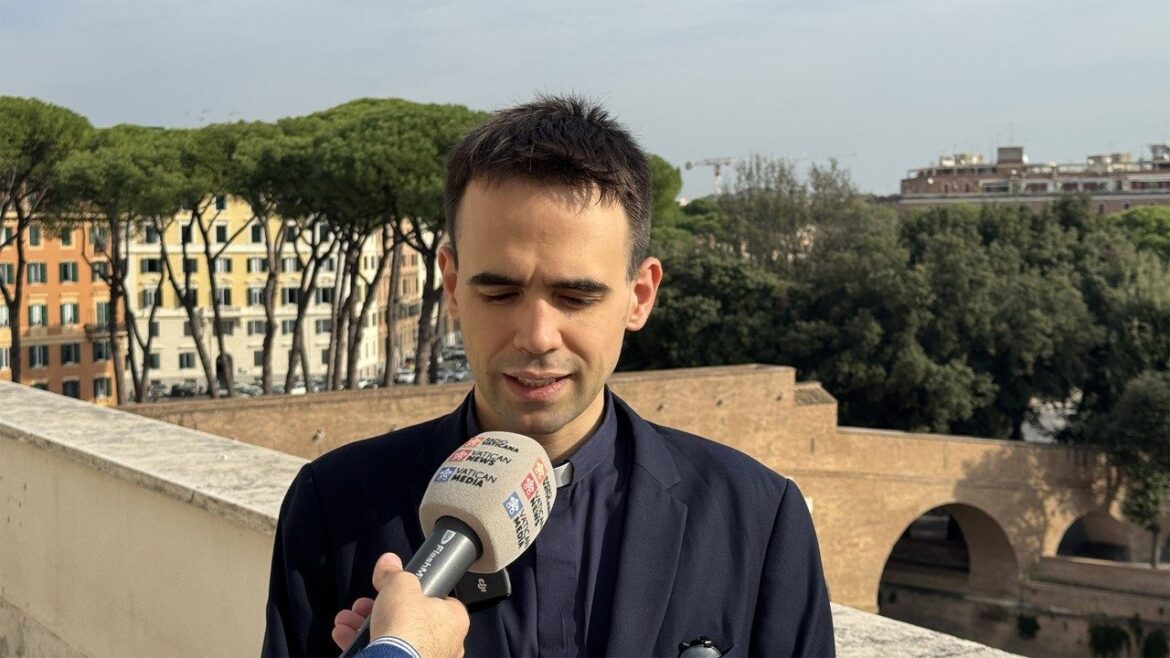Father Mattia Ferrari, coordinator of the World Meeting of Popular Movements (EMMP), speaks to Vatican News, as the network and its members prepares to gather in Rome for their fifth world meeting, which will include an audience with Pope Leo.
By Isabella H. de Carvalho
From October 21 to 26, the members of the World Meeting of Popular Movements (Encuentro Mundial de Movimientos Populares, EMMP) will gather in Rome for their fifth meeting – which will include an audience with Pope Leo XIV on October 23 – followed by a Jubilee pilgrimage. Father Mattia Ferrari, coordinator of the EMMP, spoke to Vatican News about the importance of this moment, as the popular movements enter a new phase of trying to organize concretely the hope that many of their realities represent. He also highlighted how the Church walks hand-in-hand with the popular movements and how their work takes a new significance with Pope Leo’s Apostolic Exhortation Dilexi te, focused on the love for the poor.
During the press conference on October 15 on the upcoming Fifth World Meeting of Popular Movements, you said this is “not an event, but a step in a process“. What did you mean by this?
What Pope Francis taught us is that we don’t have to pay so much attention to events, but to creating processes. This process began in many cities and countries across the world, where the Church started to accompany popular movements. In Buenos Aires, Argentina, then Cardinal Jorge Mario Bergoglio accompanied, for example, “cartoneros” [paper waste collectors], “trabajadores excluidos” [excluded workers].
When Pope Francis was elected, many felt that the Holy Spirit was saying that it was the right moment for this path to take another important step. The Church had to meet at a universal level with the popular movements in order to move forward together in this process. This is what we did in the last 10 years.
The World Meeting of Popular Movements were very important in helping popular movements be recognized for what they are and as a topic of history. Pope Francis’ speeches to those meetings are significant because in them you find the deep meaning of popular movements, of their involvement, and of their relationship with the Church.
Now we have to start another phase: that of organizing hope. Popular movements represent hope for many people, but they also have to be organized. So popular movements from the whole world will gather again, accompanied by the local Churches, in order to try, by the grace of God, to fulfil this task.
Can you explain what being accompanied by the Church means for the popular movements and what this looks like?
This was what Pope Francis asked us because the relationship is not just between the Pope and the popular movements, but between the Church and the popular movements. For him it was very important that popular movements walk with the Church everyday in their challenges, when they are on the road, when they are at sea, when they have to face difficult stories.
The Church accompanies them in the name of Jesus as a mother. It’s also important that now popular movements are coming again to meet the Pope, along with their local Churches that walk with them in the daily challenges. I think this is wonderful because this is the Church that Jesus wants.
What are your expectations for your upcoming meeting with Pope Leo XIV?
We are very grateful to Pope Leo, but also to the whole Church. We are sure that God through the Pope and the Church wants to take care of the poor, of the popular movements. Pope Leo’s apostolic exhortation Dilexi te taught us this very well. We don’t have a particular expectation, just that the whole Church will continue to put into practice what Jesus wants.
In our case that means being the Church that takes by hand the popular movements and walks with them every day, everywhere people are crying, everywhere there are injustices, everywhere there is a violence, in all the places people are in need. Popular movements are the poor who organize themselves. In the last year we felt in our flesh that the Church is there as well. This is why when we walk together, we can really generate hope in the world.
How do the popular movements translate into action Pope Leo’s invitation in Dilexi te to love the poor?
Popular movements are composed of the poor and by people who are close to the poor. I think that Dilexi te is wonderful, there are many passages that are very important, but what we especially appreciated is that Pope Leo included the popular movements in the chapter about the history of the Church and its history of love for the poor. This is very important because he’s saying that the Church accompanying the popular movements is not something strange, but is part of the history of the Church.
Dilexi te doesn’t also only speak about the Church’s service to the poor. It says that the Church loves the poor. This is different because if you serve someone, you could be doing it because of your political ideology, or maybe just because you are a good person and want to help. This is normal, but this is not what the church does. The Church loves the poor and this love has a political value. Only by looking at this love, can you understand the mystery of Christ, the mystery of the Church, and also why it works with the popular movements.

